Paper Menu >>
Journal Menu >>
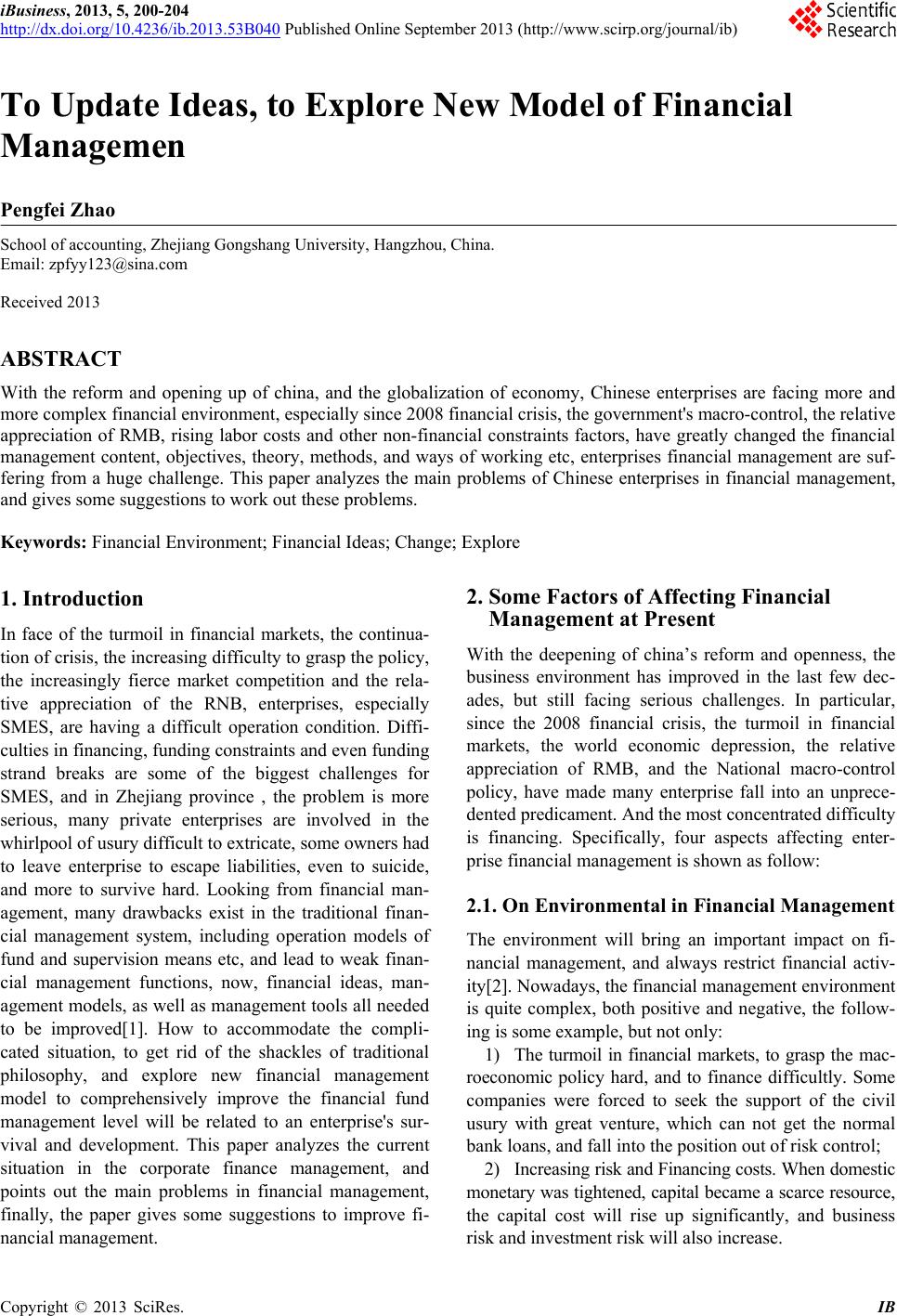 iBusiness, 2013, 5, 200-204 http://dx.doi.org/10.4236/ib.2013.53B040 Published Online September 2013 (http://www.scirp.org/journal/ib) To Update Ideas, to Explore New Model of Financial Managemen Pengfei Zhao School of accounting, Zhejiang Gongshang University, Hangzhou, China. Email: zpfyy123@sina.com Received 2013 ABSTRACT With the reform and opening up of china, and the globalization of economy, Chinese enterprises are facing more and more complex financial environment, especially since 2008 financial crisis, the government's macro-control, the relative appreciation of RMB, rising labor costs and other non-financial constraints factors, have greatly changed the financial management content, objectives, theory, methods, and ways of working etc, enterprises financial management are suf- fering from a huge challenge. This paper analyzes the main problems of Chinese enterprises in financial management, and gives some suggestions to work out these problems. Keywords: Financial Environment; Financial Ideas; Change; Explore 1. Introduction In face of the turmoil in financial markets, the continua- tion of crisis, the increasing difficulty to grasp the policy, the increasingly fierce market competition and the rela- tive appreciation of the RNB, enterprises, especially SMES, are having a difficult operation condition. Diffi- culties in financing, fund ing con straints and even fund ing strand breaks are some of the biggest challenges for SMES, and in Zhejiang province , the problem is more serious, many private enterprises are involved in the whirlpool of usury difficult to extricate, some owners had to leave enterprise to escape liabilities, even to suicide, and more to survive hard. Looking from financial man- agement, many drawbacks exist in the traditional finan- cial management system, including operation models of fund and supervision means etc, and lead to weak finan- cial management functions, now, financial ideas, man- agement models, as well as management tools all needed to be improved[1]. How to accommodate the compli- cated situation, to get rid of the shackles of traditional philosophy, and explore new financial management model to comprehensively improve the financial fund management level will be related to an enterprise's sur- vival and development. This paper analyzes the current situation in the corporate finance management, and points out the main problems in financial management, finally, the paper gives some suggestions to improve fi- nancial management. 2. Some Factors of Affecting Financial Management at Present With the deepening of china’s reform and openness, the business environment has improved in the last few dec- ades, but still facing serious challenges. In particular, since the 2008 financial crisis, the turmoil in financial markets, the world economic depression, the relative appreciation of RMB, and the National macro-control policy, have made many enterprise fall into an unprece- dented predicament. And the most concentrated difficu lty is financing. Specifically, four aspects affecting enter- prise financial management is shown as follow: 2.1. On Environmental in Financial Management The environment will bring an important impact on fi- nancial management, and always restrict financial activ- ity[2]. Nowadays, the financial management environment is quite complex, both positive and negative, the follow- ing is some example, but not only: 1) The turmoil in financial markets, to grasp the mac- roeconomic policy hard, and to finance difficultly. Some companies were forced to seek the support of the civil usury with great venture, which can not get the normal bank loans, and fall into the position out of risk control; 2) Increasing risk and Financing costs. When domestic monetary was tightened, capital became a scarce resource, the capital cost will rise up significantly, and business risk and investment risk will also increase. Copyright © 2013 SciRes. IB 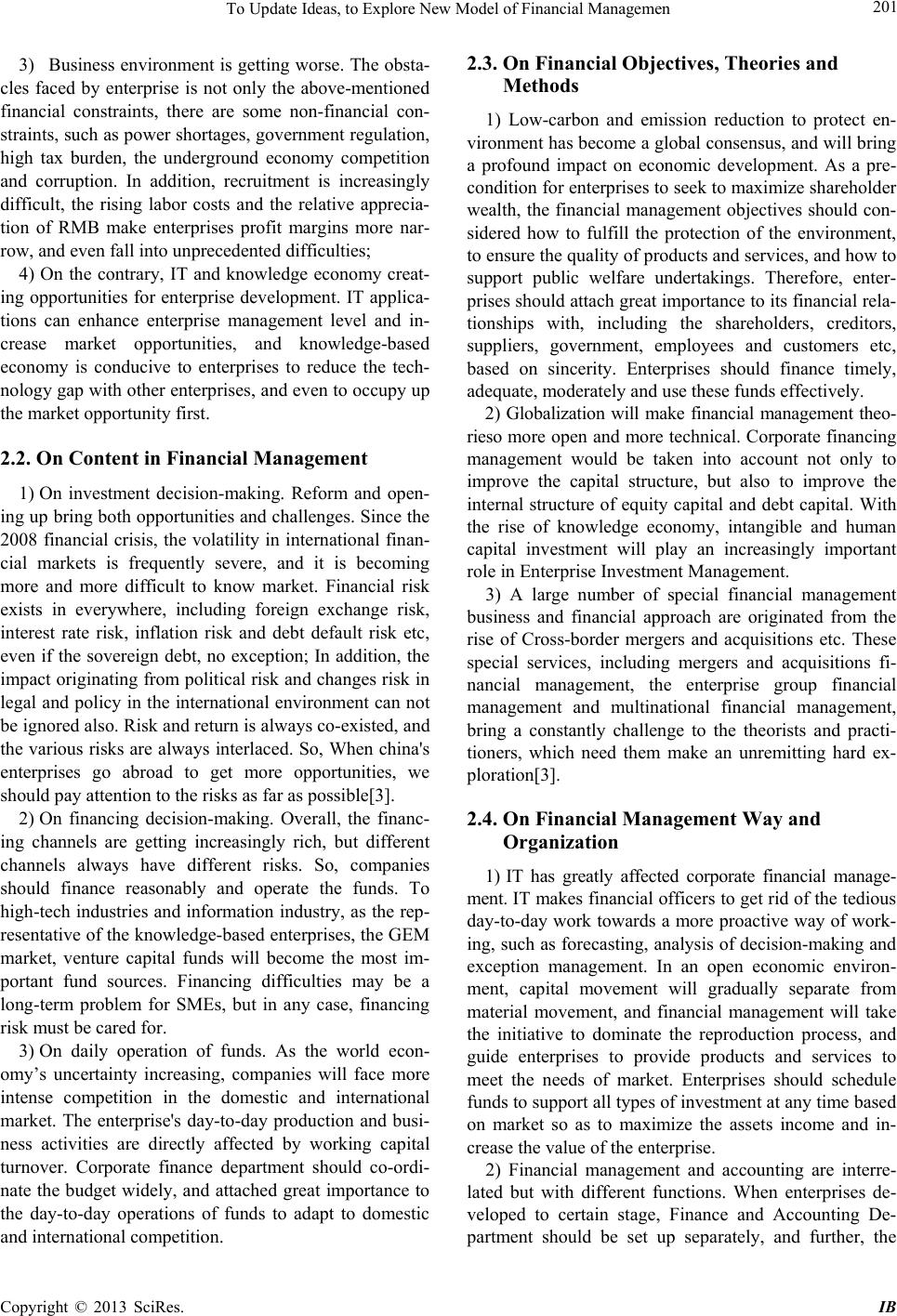 To Update Ideas, to Explore New Model of Financial Managemen 201 3) Business environment is getting worse. The obsta- cles faced by enterprise is not only the above-mentioned financial constraints, there are some non-financial con- straints, such as power shortages, government regulation, high tax burden, the underground economy competition and corruption. In addition, recruitment is increasingly difficult, the rising labor costs and the relative apprecia- tion of RMB make enterprises profit margins more nar- row, and even fall into unprecedented difficulties; 4) On the contrary, IT and knowledge economy creat- ing opportunities for enterprise development. IT applica- tions can enhance enterprise management level and in- crease market opportunities, and knowledge-based economy is conducive to enterprises to reduce the tech- nology gap with other enterprises, and even to occupy up the market opportunity first. 2.2. On Content in Financial Management 1) On investment decision-making. Reform and open- ing up br ing both opportun ities and challenges. Since the 2008 financial crisis, the volatility in international finan- cial markets is frequently severe, and it is becoming more and more difficult to know market. Financial risk exists in everywhere, including foreign exchange risk, interest rate risk, inflation risk and debt default risk etc, even if the sovereign debt, no exception; In addition, the impact originating from political risk an d changes risk in legal and policy in the international environment can not be ignored also. Risk and return is always co-existed, and the various risks are always interlaced. So, When china's enterprises go abroad to get more opportunities, we should pay attention to the risks as far as po ssible[3]. 2) On financing decision-making. Overall, the financ- ing channels are getting increasingly rich, but different channels always have different risks. So, companies should finance reasonably and operate the funds. To high-tech industries and information industry, as the rep- resentative of the knowledge-based enterprises, the GEM market, venture capital funds will become the most im- portant fund sources. Financing difficulties may be a long-term problem for SMEs, but in any case, financing risk must be cared for. 3) On daily operation of funds. As the world econ- omy’s uncertainty increasing, companies will face more intense competition in the domestic and international market. The enterprise's day-to-day production and busi- ness activities are directly affected by working capital turnover. Corporate finance department should co-ordi- nate the budget widely, and attached great importance to the day-to-day operations of funds to adapt to domestic and international competition . 2.3. On Financial Objectives, Theories and Methods 1) Low-carbon and emission reduction to protect en- vironment has become a global consensus, an d will bring a profound impact on economic development. As a pre- condition for en terprises to seek to maximiz e shareholder wealth, the financial management objectives should con- sidered how to fulfill the protection of the environment, to ensure the quality of products an d services, and how to support public welfare undertakings. Therefore, enter- prises should attach g reat importance to its financial rela- tionships with, including the shareholders, creditors, suppliers, government, employees and customers etc, based on sincerity. Enterprises should finance timely, adequate, moderately and use these funds effectively. 2) Globalization will make financial management theo- rieso more open and more technical. Corporate financing management would be taken into account not only to improve the capital structure, but also to improve the internal structure of equity capital and debt capital. With the rise of knowledge economy, intangible and human capital investment will play an increasingly important role in Enterprise Investment Management. 3) A large number of special financial management business and financial approach are originated from the rise of Cross-border mergers and acquisitions etc. These special services, including mergers and acquisitions fi- nancial management, the enterprise group financial management and multinational financial management, bring a constantly challenge to the theorists and practi- tioners, which need them make an unremitting hard ex- ploration[3]. 2.4. On Financial Management Way and Organization 1) IT has greatly affected corporate financial manage- ment. IT makes financial officers to get rid of the tedious day-to-day work towards a more proactive way of work- ing, such as forecasting, analysis of decision-making and exception management. In an open economic environ- ment, capital movement will gradually separate from material movement, and financial management will take the initiative to dominate the reproduction process, and guide enterprises to provide products and services to meet the needs of market. Enterprises should schedule funds to support all type s of inv estment at any time based on market so as to maximize the assets income and in- crease the value of the enterprise. 2) Financial management and accounting are interre- lated but with different functions. When enterprises de- veloped to certain stage, Finance and Accounting De- partment should be set up separately, and further, the Copyright © 2013 SciRes. IB 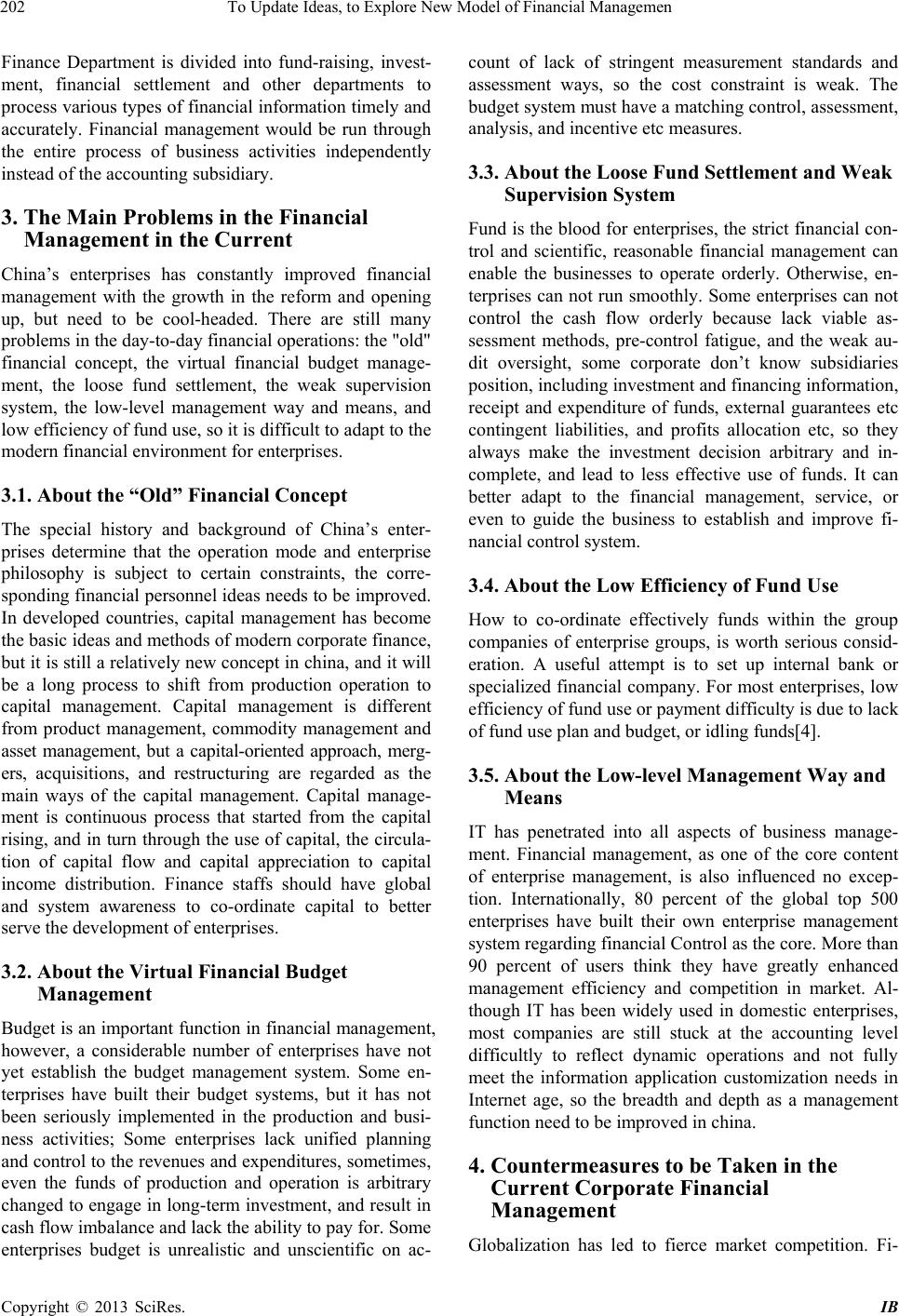 To Update Ideas, to Explore New Model of Financial Managemen 202 Finance Department is divided into fund-raising, invest- ment, financial settlement and other departments to process various types of financial information timely and accurately. Financial management would be run through the entire process of business activities independently instead of the accounting subsidiary. 3. The Main Problems in the Financial Management in the Current China’s enterprises has constantly improved financial management with the growth in the reform and opening up, but need to be cool-headed. There are still many problems in the day-to-day finan cial operations: the "o ld" financial concept, the virtual financial budget manage- ment, the loose fund settlement, the weak supervision system, the low-level management way and means, and low efficiency of fund use, so it is difficult to ad apt to th e modern financial environment for enterprises. 3.1. About the “Old” Financial Concept The special history and background of China’s enter- prises determine that the operation mode and enterprise philosophy is subject to certain constraints, the corre- sponding financial personnel ideas needs to be improved. In developed countries, capital management has become the basic ideas and methods of modern corporate finance, but it is still a relatively new concept in china, and it will be a long process to shift from production operation to capital management. Capital management is different from product management, commodity management and asset management, but a capital-oriented approach, merg- ers, acquisitions, and restructuring are regarded as the main ways of the capital management. Capital manage- ment is continuous process that started from the capital rising, and in turn through the use of capital, the circula- tion of capital flow and capital appreciation to capital income distribution. Finance staffs should have global and system awareness to co-ordinate capital to better serve the development of enterprises. 3.2. About the Virtual Financial Budget Management Budget is an important function in financial management, however, a considerable number of enterprises have not yet establish the budget management system. Some en- terprises have built their budget systems, but it has not been seriously implemented in the production and busi- ness activities; Some enterprises lack unified planning and control to the revenues and expenditures, sometimes, even the funds of production and operation is arbitrary changed to engage in long-term investment, and result in cash flow imbalance and lack the ability to pay for. Some enterprises budget is unrealistic and unscientific on ac- count of lack of stringent measurement standards and assessment ways, so the cost constraint is weak. The budget system must have a matching control, assessment, analysis, and incentive etc measures. 3.3. About the Loose Fund Settlement and Weak Supervision System Fund is the blood for enterprises, th e strict financial con- trol and scientific, reasonable financial management can enable the businesses to operate orderly. Otherwise, en- terprises can not run smoothly. Some enterprises can not control the cash flow orderly because lack viable as- sessment methods, pre-control fatigue, and the weak au- dit oversight, some corporate don’t know subsidiaries position, including investmen t and financing information , receipt and expenditure of funds, external guarantees etc contingent liabilities, and profits allocation etc, so they always make the investment decision arbitrary and in- complete, and lead to less effective use of funds. It can better adapt to the financial management, service, or even to guide the business to establish and improve fi- nancial control system. 3.4. About the Low Efficiency of Fund Use How to co-ordinate effectively funds within the group companies of enterprise groups, is worth serious consid- eration. A useful attempt is to set up internal bank or specialized financial company. For most enterprises, low efficiency of fund use or payment difficulty is due to lack of fund use plan and budget, or idling funds[4]. 3.5. About the Low-level Management Way and Means IT has penetrated into all aspects of business manage- ment. Financial management, as one of the core content of enterprise management, is also influenced no excep- tion. Internationally, 80 percent of the global top 500 enterprises have built their own enterprise management system regarding financial Control as the core. More than 90 percent of users think they have greatly enhanced management efficiency and competition in market. Al- though IT has been widely used in domestic enterprises, most companies are still stuck at the accounting level difficultly to reflect dynamic operations and not fully meet the information application customization needs in Internet age, so the breadth and depth as a management function need to be improved in china. 4. Countermeasures to be Taken in the Current Corporate Financial Management Globalization has led to fierce market competition. Fi- Copyright © 2013 SciRes. IB 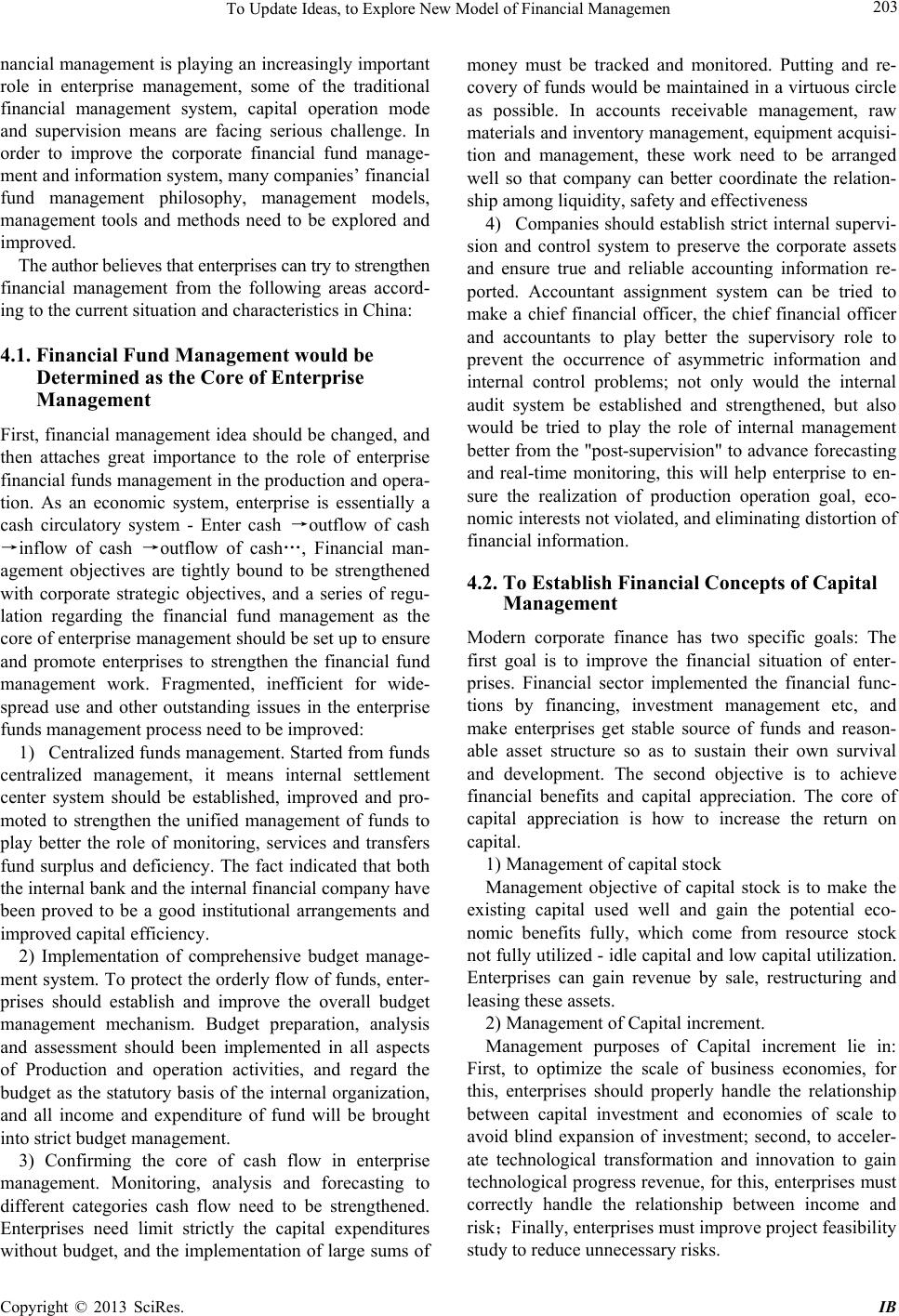 To Update Ideas, to Explore New Model of Financial Managemen 203 nancial management is playing an increasingly important role in enterprise management, some of the traditional financial management system, capital operation mode and supervision means are facing serious challenge. In order to improve the corporate financial fund manage- ment and information system, many companies’ financial fund management philosophy, management models, management tools and methods need to be explored and improved. The author believes that enterprises can try to strengthen financial management from the following areas accord- ing to the cu rrent situation and ch aracteristics in China: 4.1. Financial Fund Management would be Determined as the Core of Enterprise Management First, financial management idea should be changed, and then attaches great importance to the role of enterprise financial funds management in the production and opera- tion. As an economic system, enterprise is essentially a cash circulatory system - Enter cash →outflow of cash →inflow of cash →outflow of cash…, Financial man- agement objectives are tightly bound to be strengthened with corporate strategic objectives, and a series of regu- lation regarding the financial fund management as the core of enterprise management should be set up to ensure and promote enterprises to strengthen the financial fund management work. Fragmented, inefficient for wide- spread use and other outstanding issues in the enterprise funds management process need to be improved: 1) Centralized funds management. Started from funds centralized management, it means internal settlement center system should be established, improved and pro- moted to strengthen the unified management of funds to play better the role of monitoring, services and transfers fund surplus and deficiency. The fact indicated that both the internal bank and th e intern al financial company have been proved to be a good institutional arrangements and improved capital efficiency. 2) Implementation of comprehensive budget manage- ment system. To protect the orderly flow of funds, enter- prises should establish and improve the overall budget management mechanism. Budget preparation, analysis and assessment should been implemented in all aspects of Production and operation activities, and regard the budget as the statutory basis of the internal organization, and all income and expenditure of fund will be brought into strict budget management. 3) Confirming the core of cash flow in enterprise management. Monitoring, analysis and forecasting to different categories cash flow need to be strengthened. Enterprises need limit strictly the capital expenditures without budget, and th e implementation of large su ms of money must be tracked and monitored. Putting and re- covery of funds w ould be maintained in a vir tuous circle as possible. In accounts receivable management, raw materials and inventory management, equipment acquisi- tion and management, these work need to be arranged well so that company can better coordinate the relation- ship among liquidity, safety and effectiveness 4) Companies should establish strict intern al supervi- sion and control system to preserve the corporate assets and ensure true and reliable accounting information re- ported. Accountant assignment system can be tried to make a chief financial officer, the chief financial officer and accountants to play better the supervisory role to prevent the occurrence of asymmetric information and internal control problems; not only would the internal audit system be established and strengthened, but also would be tried to play the role of internal management better from the "post-supervision" to advance forecasting and real-time monitoring, this will help enterprise to en- sure the realization of production operation goal, eco- nomic interests not violated, and eliminating distortion of financial information. 4.2. To Establish Financial Concepts of Capital Management Modern corporate finance has two specific goals: The first goal is to improve the financial situation of enter- prises. Financial sector implemented the financial func- tions by financing, investment management etc, and make enterprises get stable source of funds and reason- able asset structure so as to sustain their own survival and development. The second objective is to achieve financial benefits and capital appreciation. The core of capital appreciation is how to increase the return on capital. 1) Management of capital stock Management objective of capital stock is to make the existing capital used well and gain the potential eco- nomic benefits fully, which come from resource stock not fully utilized - idle capital and low capital utilization. Enterprises can gain revenue by sale, restructuring and leasing these assets. 2) Management of Capital increment. Management purposes of Capital increment lie in: First, to optimize the scale of business economies, for this, enterprises should properly handle the relationship between capital investment and economies of scale to avoid blind expansion of investment; second, to acceler- ate technological transformation and innovation to gain technological progress revenue, for this, enterprises must correctly handle the relationship between income and risk;Finally, enterprises must improve project feasibility study to reduce unnecessary risks. Copyright © 2013 SciRes. IB 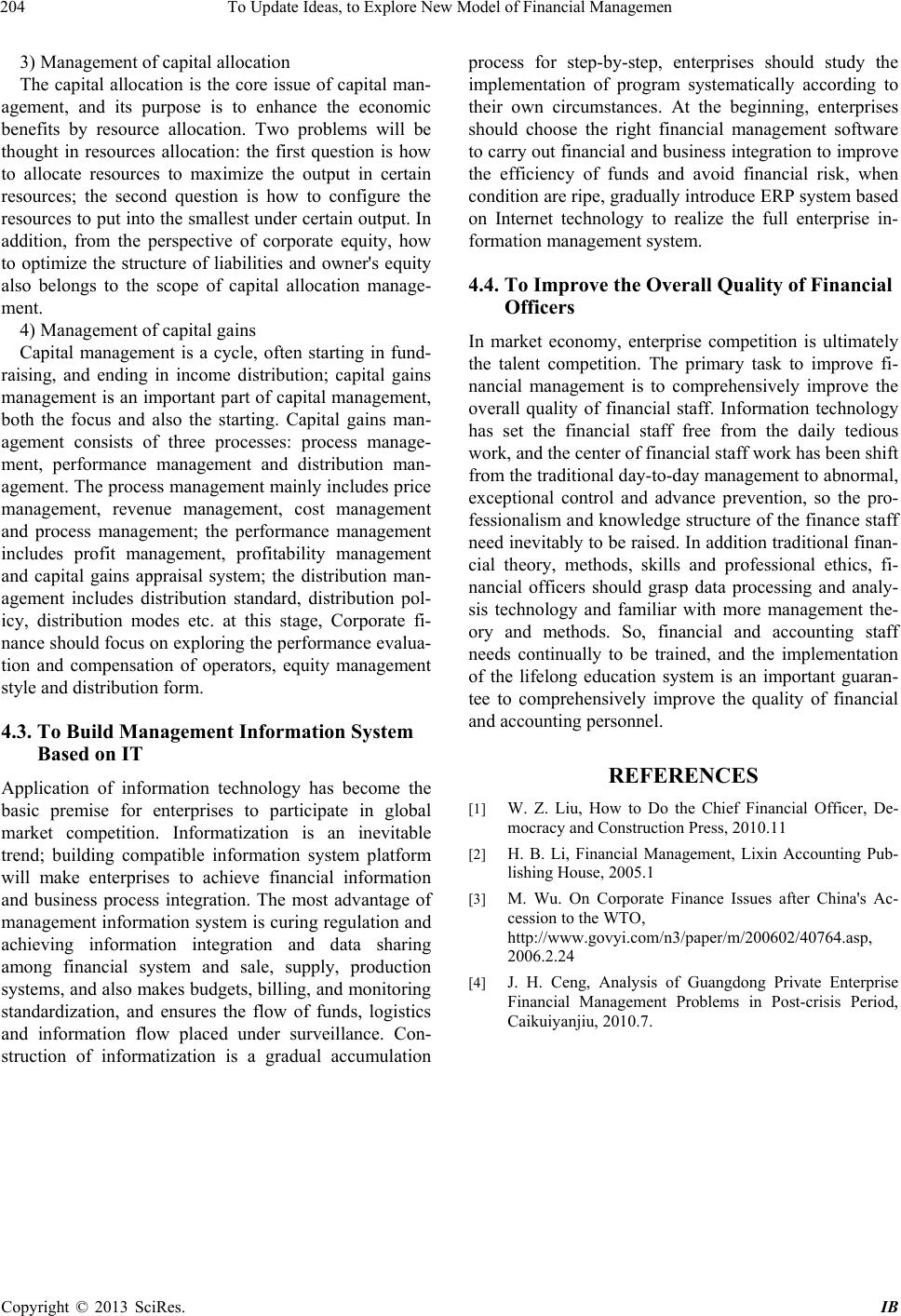 To Update Ideas, to Explore New Model of Financial Managemen Copyright © 2013 SciRes. IB 204 3) Management of capital allocation The capital allocation is the core issue of capital man- agement, and its purpose is to enhance the economic benefits by resource allocation. Two problems will be thought in resources allocation: the first question is how to allocate resources to maximize the output in certain resources; the second question is how to configure the resources to put into the smallest under certain output. In addition, from the perspective of corporate equity, how to optimize the structure of liabilities and owner's equity also belongs to the scope of capital allocation manage- ment. 4) Management of capital gains Capital management is a cycle, often starting in fund- raising, and ending in income distribution; capital gains management is an important part of capital management, both the focus and also the starting. Capital gains man- agement consists of three processes: process manage- ment, performance management and distribution man- agement. The process management mainly includes price management, revenue management, cost management and process management; the performance management includes profit management, profitability management and capital gains appraisal system; the distribution man- agement includes distribution standard, distribution pol- icy, distribution modes etc. at this stage, Corporate fi- nance should focus on exploring the performance evalua- tion and compensation of operators, equity management style and distribution form. 4.3. To Build Management Information System Based on IT Application of information technology has become the basic premise for enterprises to participate in global market competition. Informatization is an inevitable trend; building compatible information system platform will make enterprises to achieve financial information and business process integration. The most advantage of management information system is curing regulation and achieving information integration and data sharing among financial system and sale, supply, production systems, and also makes budgets, billing, and monito ring standardization, and ensures the flow of funds, logistics and information flow placed under surveillance. Con- struction of informatization is a gradual accumulation process for step-by-step, enterprises should study the implementation of program systematically according to their own circumstances. At the beginning, enterprises should choose the right financial management software to carry out financial and business integration to improve the efficiency of funds and avoid financial risk, when condition are ripe, gradually introduce ERP system based on Internet technology to realize the full enterprise in- formation management system. 4.4. To Improve the Overall Quality of Financial Officers In market economy, enterprise competition is ultimately the talent competition. The primary task to improve fi- nancial management is to comprehensively improve the overall quality of financial staff. Information technology has set the financial staff free from the daily tedious work, and the center of fi na ncial staff work has been shift from the traditional day-to-day management to abnormal, exceptional control and advance prevention, so the pro- fessionalism and knowledg e structure of the finance staff need inevitably to be raised. In additio n traditional finan- cial theory, methods, skills and professional ethics, fi- nancial officers should grasp data processing and analy- sis technology and familiar with more management the- ory and methods. So, financial and accounting staff needs continually to be trained, and the implementation of the lifelong education system is an important guaran- tee to comprehensively improve the quality of financial and accounting personnel. REFERENCES [1] W. Z. Liu, How to Do the Chief Financial Officer, De- mocracy and Construction Press, 2010.11 [2] H. B. Li, Financial Management, Lixin Accounting Pub- lishing House, 2005.1 [3] M. Wu. On Corporate Finance Issues after China's Ac- cession to the WTO, http://www.govyi.com/n3/paper/m/200602/40764.asp, 2006.2.24 [4] J. H. Ceng, Analysis of Guangdong Private Enterprise Financial Management Problems in Post-crisis Period, Caikuiyanjiu, 2010.7. |

